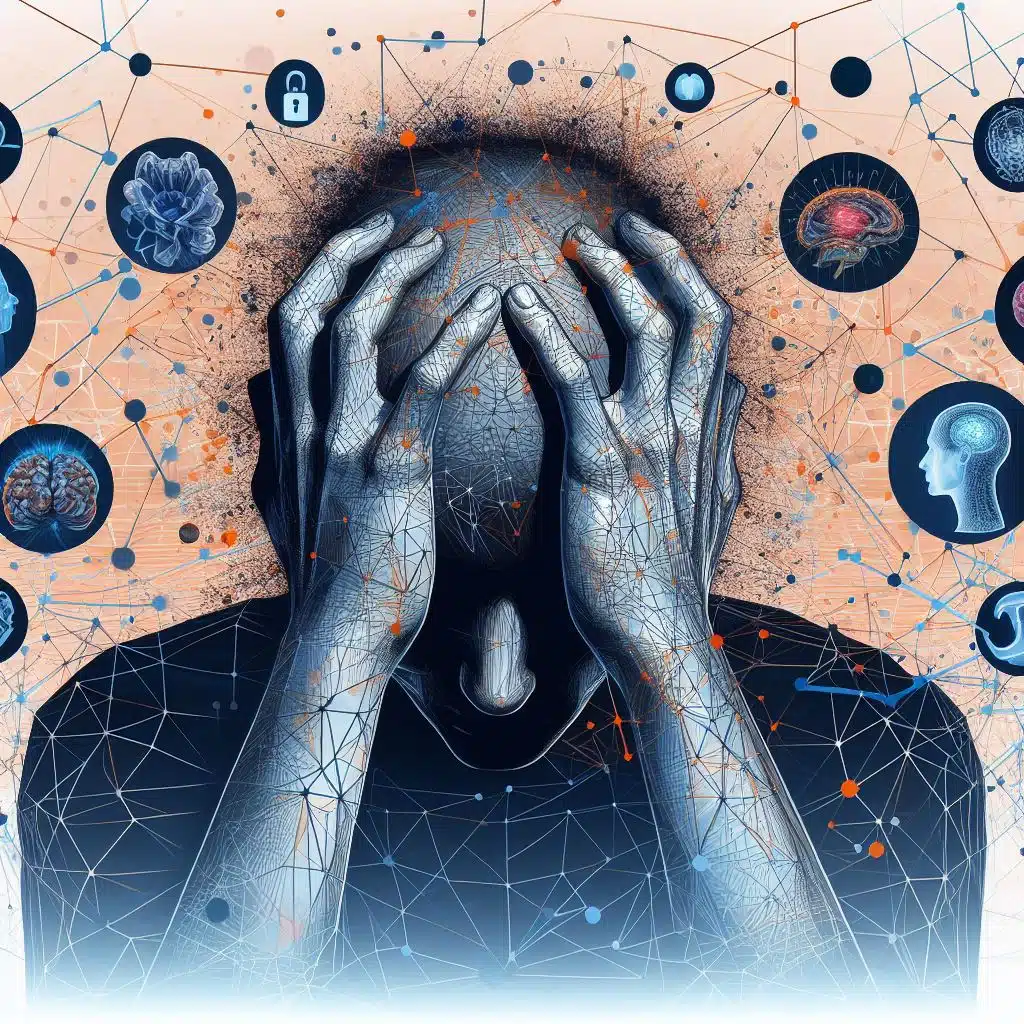Anxiety attacks, often viewed as episodes of sudden, intense fear, can have profound effects on mental and physical health. This detailed analysis examines how these crises disrupt the balance of our well-being.
I. Mental health effects:
1. Increase in anxiety and depressive disorders:
– The mechanisms and symptoms of recurrent anxiety attacks involve the activation or exacerbation of anxiety and depressive disorders. Serotonin and GABA, two neurotransmitters that are important for mood and anxiety regulation, are among the brain chemistry that chronic stress may alter, which could account for part of this interaction.
– Prolonged anxiety, unreasonable concern, difficulty relaxing, mood fluctuations, and disinterest in once enjoyable activities are signs of these disorders. Physical signs including tremors, palpitations in the heart, and extreme exhaustion may also accompany these symptoms.
– Long-term effects: This illness may cause a person to become hypervigilant, which makes them always on guard and exacerbates the cycle of anxiety and sadness. Moreover, it may result in helplessness and hopelessness, which will only feed the depressive cycle.
2. Deterioration in sleep quality:
– The link between disorders of the sleep and anxiety The primary cause of sleep disturbance is chronic anxiety. Anxious people frequently experience insomnia as a result of their inability to fall or stay asleep. Anxiety-induced mental hyperactivity makes it challenging to reach the state of relaxation required for sound sleep.
– Cascade Effects: In addition to being an indication of anxiety, sleep deprivation can exacerbate pre-existing fears and start a vicious cycle. Insufficient sleep can impair your emotional regulation skills, lower your stress threshold, and potentially heighten your vulnerability to symptoms of anxiety.
II. Effects on relationships and social life:
1. Social withdrawal:
People who suffer from severe anxiety tend to isolate themselves socially. Anxiety can make social interactions tiring and fuel the desire to withdraw to avoid stress. This can lead to loneliness and social isolation, increased anxiety and depression.
2. Impact on Personal and Professional Relationships:
Anxiety can affect your ability to maintain healthy relationships. This can strain personal relationships, affect work performance, and limit the ability to participate in social activities, leading to an overall decline in quality of life.
3. Management Strategies:
Effective treatment for anxiety may include cognitive behavioral therapies, medications, and stress management techniques such as meditation and mindfulness. It is also important to maintain a regular daily routine, eat a healthy diet, and exercise regularly to manage anxiety.
Repeated bouts of anxiety can have profound and varied consequences, affecting not only mental health but also overall quality of life. A thorough understanding of these influences is essential for developing effective management strategies.
III. Profound physical health consequences:
1. Autonomic nervous system dysfunction:
– Detailed explanation: An imbalance in the autonomic nervous system, which controls unconscious bodily functions, may result from recurrent episodes of anxiety. The body of a person who experiences anxiety often may stay in a “fight-or-flight” mode, which exacerbates the stress response by producing more cortisol and adrenaline.
2. Manifestations bodily:
Chest tightness, tremors, excessive sweating, and palpitations are typical symptoms. Not only can these symptoms be bothersome, but they may also raise anxiety about bodily reactions, which exacerbates anxiety attacks.
IV. Effect on the Digestive System:
1. Digestive Perturbations:
The digestive system may function more slowly when anxious. Gastric acid production and intestinal motility can be hampered by stress and anxiety, which can lead to symptoms like nausea, upset stomach, and trouble transiting the stomach.
2. Conditions in the Long Run:
Long-term conditions like gastroduodenal ulcers and irritable intestine syndrome can have a major impact on a person’s quality of life. These conditions are often brought on by chronic stress or anxiety.
V. Effects on the Musculoskeletal System:
1. Muscular Tension:
Chronic anxiety has been linked to persistent muscle tension, especially in the dos, épaules, and nuque. Chronic pain and tension headaches are possible side effects of this strain.
2. Long-Term Repercussions:
If left untreated, this muscle tension can result in postural problems. as well muscular dysequilibrium, raising the possibility of long-term discomfort and accidents.
VI. Extra Possible Physical Repercussions:
1. Breathing difficulties:
Rapid, shallow breathing brought on by anxiety can result in hyperventilation and a suffocating feeling.
2. The surface impact:
Anxiety and stress can exacerbate a number of skin disorders, including eczema, acne, and psoriasis.3. Improve the Immunization Program:
Excessive stress can weaken the immune system, making the body more vulnerable to infections and delaying the healing of illnesses.
To sum up:
Anxiety crises are more than just isolated episodes of fear; they can have a substantial impact on global health. It is essential to recognize and address these effects in order to maintain equilibrium on both a physical and mental level. These difficulties can be successfully handled with the application of suitable therapeutic techniques and ongoing assistance.

